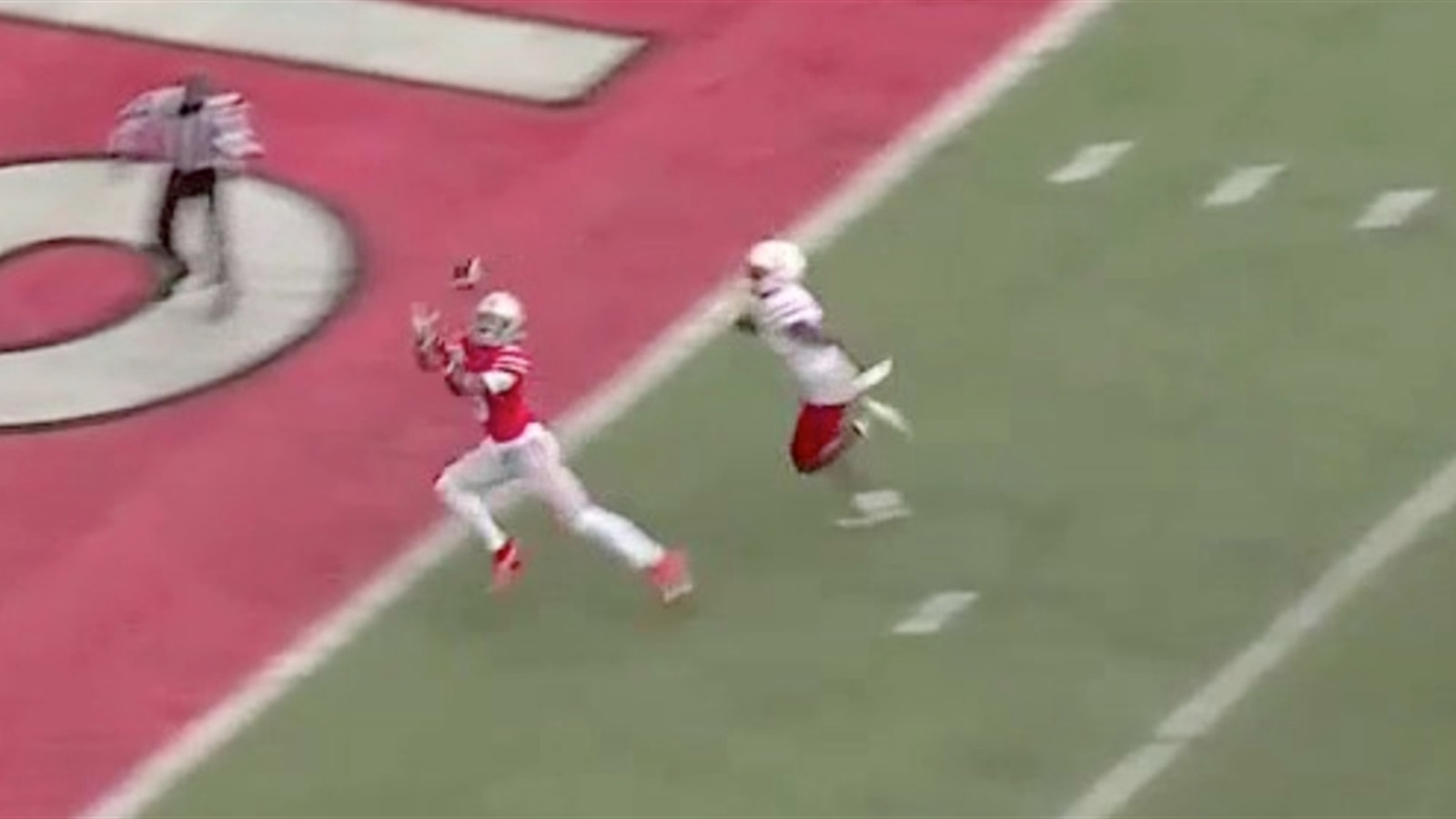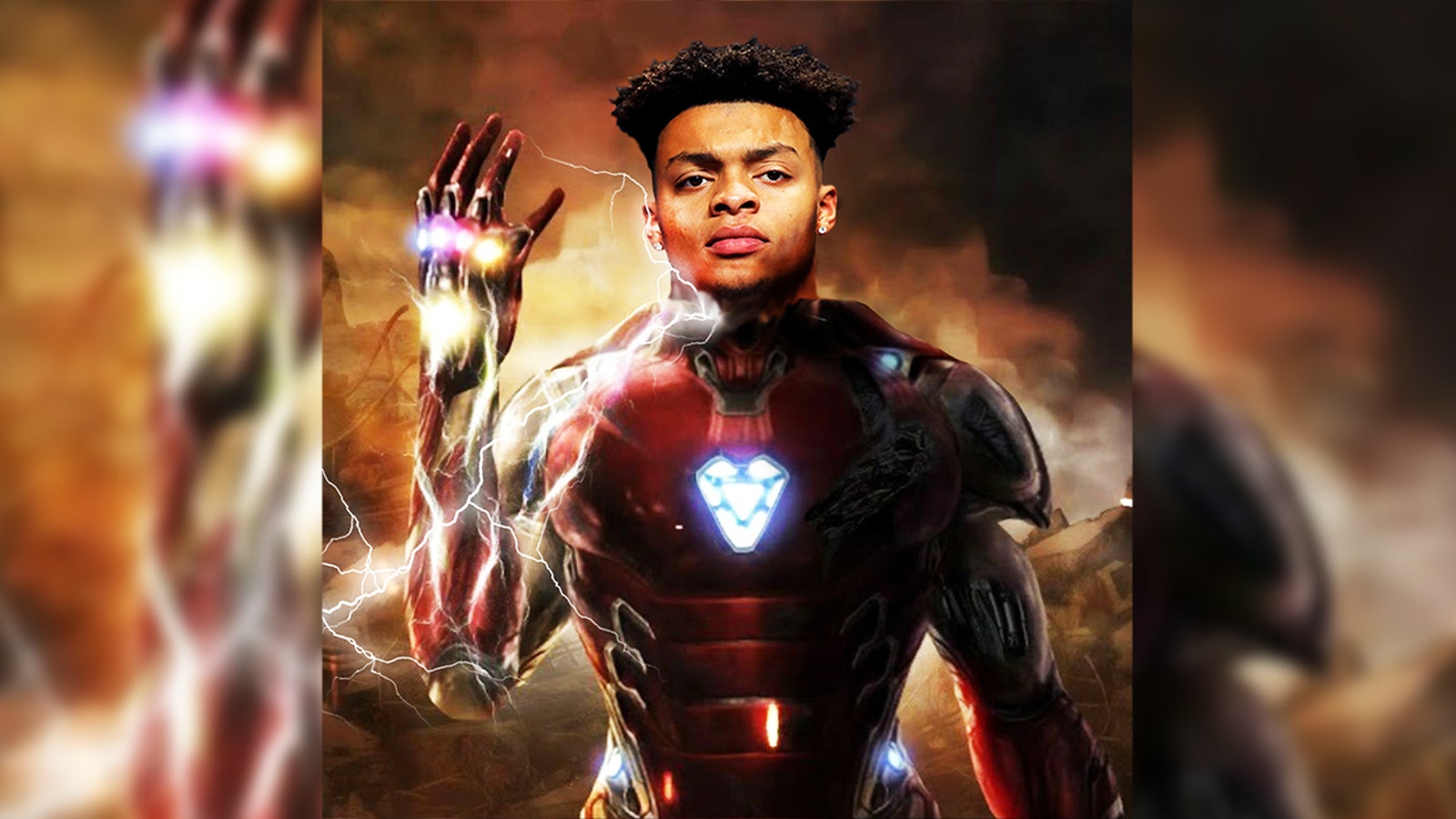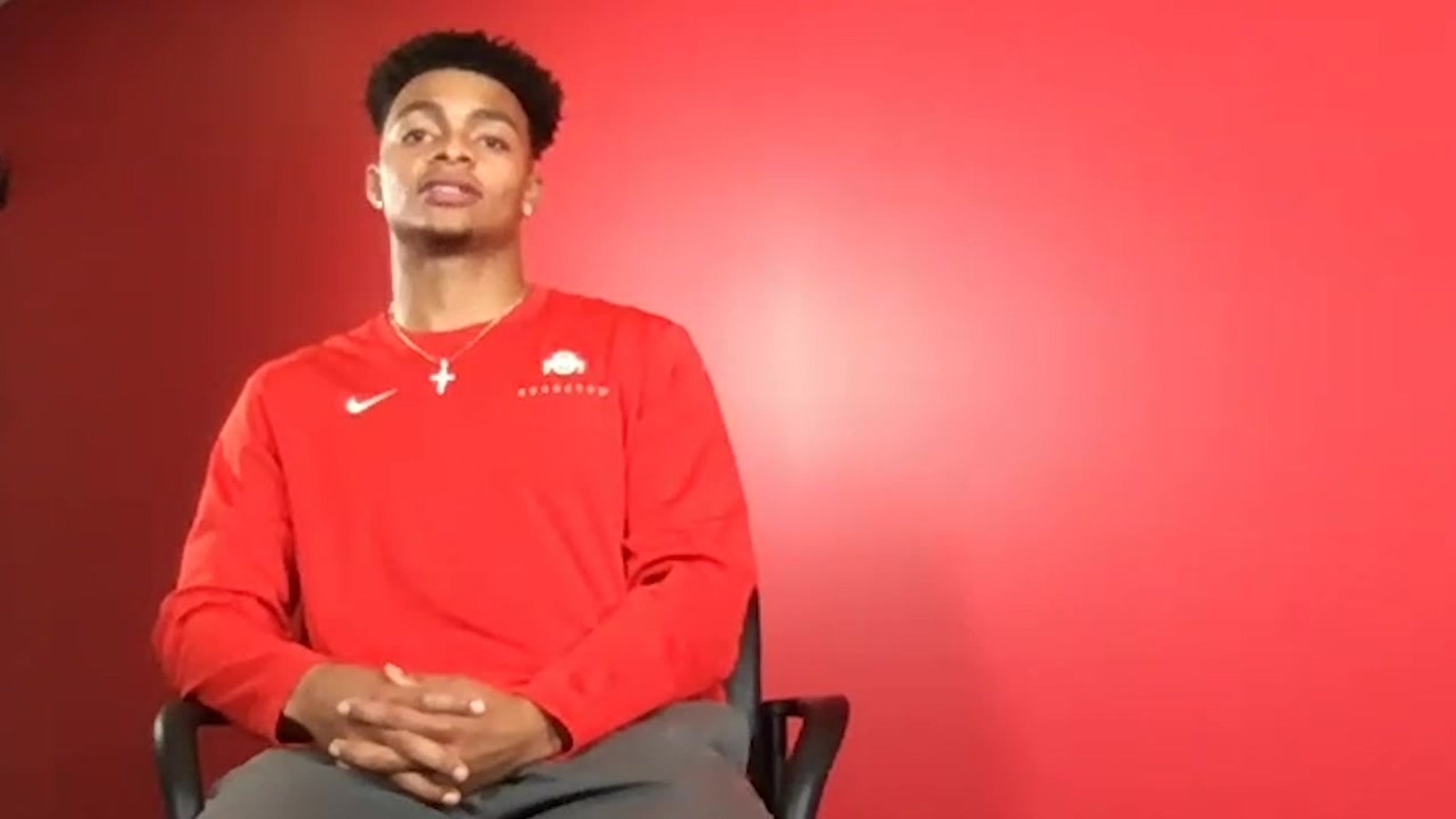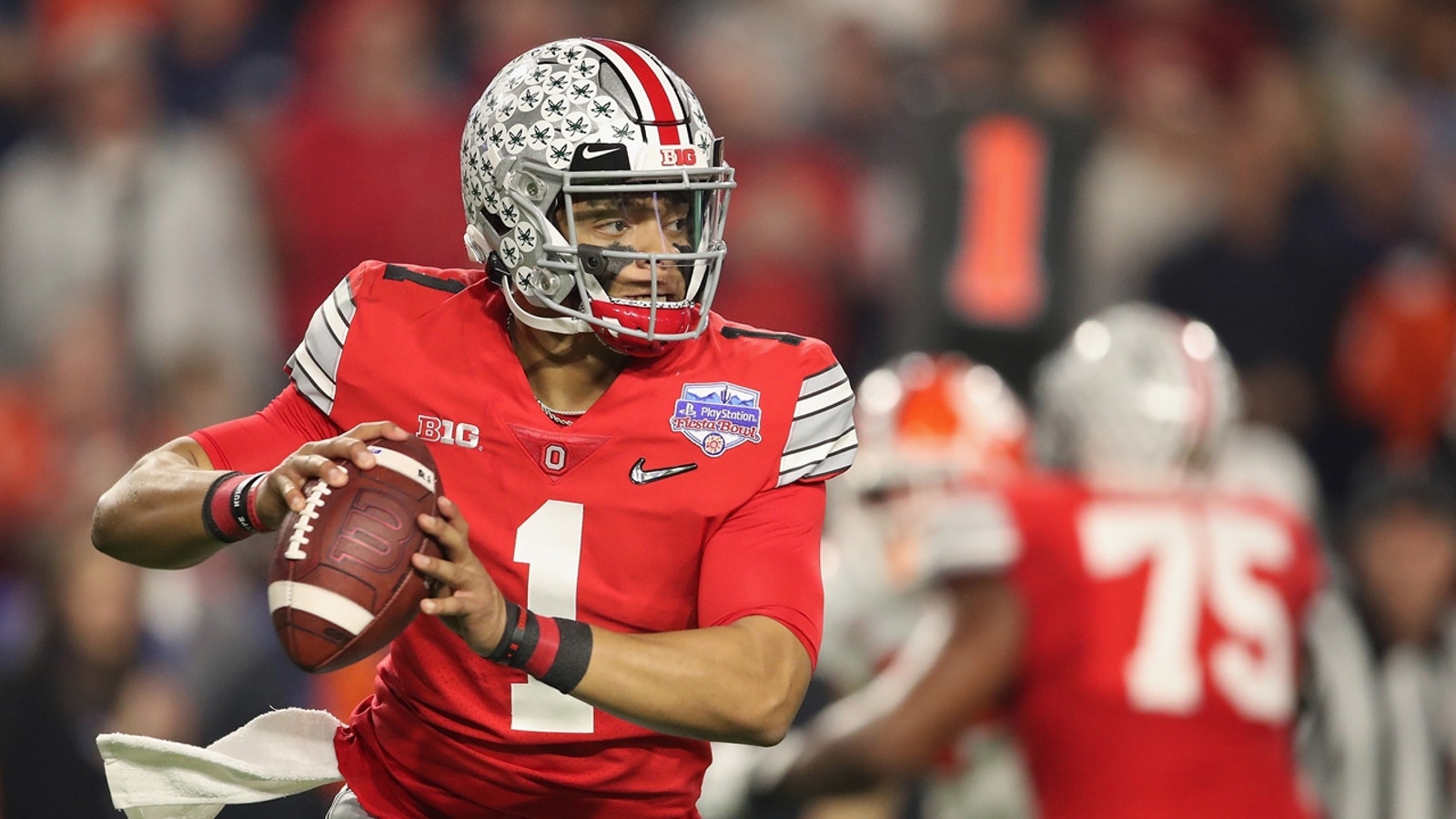
Justin Fields is Ready for His Endgame
By RJ Young
Special to FOX Sports
Justin Fields recognized the coverage and knew the play was a touchdown waiting to happen.
If he could just manipulate the Nebraska safety a bit further to his left, Fields knew he would have receiver Garrett Wilson open and streaking toward the goal post late in the first quarter of Ohio State's season opener.
His eyes quickly did the job. Then he let the ball go.
From the booth at Ohio Stadium, Gus Johnson saw the play as we did.
"Justin Fields put that one — on — the — money," he said.
"And he read it perfectly," Joel Klatt said.
Ohio State's Justin Fields finds Garrett Wilson for the go-ahead touchdown, 14-7
Fields made an NFL read, an NFL throw — the kind that reinforces what everybody knows. He is one of the two best quarterbacks in college football.
Fields finished the game with a stat line befitting a Heisman-contending quarterback on a team (re)assembled expressly to chase a national title: 20 of 21 completions for 276 yards with two touchdowns in the Buckeyes' 52-17 demolition of the Cornhuskers at the Shoe. But that was a warm-up affair.
The games Fields returned to play in 2020 are games like the next one against No. 18 Penn State on Saturday night, in prime time, on the road. The Nittany Lions, chafed by an overtime loss to Indiana to open their season, would like nothing more than to derail the Buckeyes’ attempt at repeating as Big Ten champs and earning an invitation to this season’s College Football Playoff.
To this, the Buckeyes say: Bring it.
Ohio State QB Justin Fields is Ready for his Endgame
Justin Fields came back to Ohio State to complete a mission. FOX Sports contributor RJ Young explains in the video above.
Truth is, Fields is wired for games like this one in Happy Valley. Truth is, this is when he pulls up to the phone booth with a stack of coins, swaps street clothes for that scarlet cape and drop dimes. Truth is, this is Justin Fields' time.
Even when this pandemic first hit and his final Big Ten season looked like it might not happen, Fields kept his focus on wrapping his hands around that national championship trophy.
He and the Buckeye are taking the tact of Avengers. Fields used an electronic petition like a Pym Particle to help summon one more chance, to gather stones, to assemble the gauntlet, to snap his fingers, because the last pass he threw in 2019 still feels haunted.
Last season, Fields showed up with the Stormbreaker for his first year in Columbus. But that campaign went from a "Bring me, Thanos!" moment to a final-minute heartbreaker.
Justin Fields explains why he fought so hard to bring Big Ten football back
"And, of course, I did not want to end my college career the way it ended," he told FOX's Big Noon Kickoff of the last-minute interception that ended Ohio State's season in a thrilling playoff semifinal against Clemson.
So, Fields led a movement with his voice. He and teammates made that choice. They want to play. But Fields wants to prove.
"He's just got unfinished business," his father, Ivant Fields, said. "I mean the way the season ended last year, and he kind of snuck up on everybody last year so-to-speak. I think he wants to show the world he's the best. I know who they say the best is. But I know what he thinks, and he wants the chance to show it. That he's the best."

Justin Fields got the Buckeyes to the big stage last season, but his end-zone interception against Clemson ended their hopes in the national semifinals.
Before he was called one of the two best players in college football, Fields would meet his trainer, Ron Veal, at 7 every morning before school to work on his footwork, his dexterity, to develop his craft. And though Veal was his quarterback trainer since sixth grade, Fields never said much during those workouts — except that he was going to get where he wants to be. And where did he want to be? Where winning was done.
Veal has trained quarterbacks for 18 years. Among his pupils is Clemson's Trevor Lawrence — another of the QBs he has worked with for nearly a decade ... and the reason why this story referred to Fields as one of the two best players in the college game.
During the height of college football players advocating for themselves this summer, Veal was not surprised to find Fields and Lawrence leading the charge to play, even though each arguably risks losing the most of any player in 2020.
"I think they have a competitive nature against each other," Veal said. "They need each other for what they’re trying to accomplish."
Veal knows what everyone else knows, too. That Lawrence has an edge on Fields. That he has won a national title. That he has run the table. That he already has asserted himself, and Clemson alongside him, as one of the best teams of this era. But Veal also knows Fields has a need to compete and show who he really is.
"He wants to let them know he’s there, too," Veal said.
Fields wants to be the best player in college football. His NFL dreams can wait, while he chases that title and continues to develop a talent so prodigious that it is generational.

The rest of the college football world is chasing Trevor Lawrence and Clemson — a challenge that drives Fields and the Buckeyes.
Fields enrolled early at the University of Georgia in January 2018, after Jake Fromm had led the Bulldogs to a berth in the national-title game.
A five-star recruit from Harrison High School in Kennesaw, Ga., and the top-ranked dual threat QB in his class, Fields arrived on campus already acknowledged as not just one of the best high school players in the country — but of the last decade, to some recruiting experts.
Pac-12 analyst and Elite 11 evaluator Yogi Roth said he had only seen two other players (Lawrence and Jameis Winston) who were as good as Fields.
"We always say the limiting factor in reaching your potential is flawed mechanics," Roth said. "He didn’t have any."

Fields backed up by Jake Fromm, right, throughout his freshman season in Athens.
Fields took the long way to becoming a starting quarterback at a Power 5 program. He knew he would have to battle Fromm for the job in 2018. He was already what most coaches wanted in size: a prototypical 6-foot-3, 225-pound athlete with speed on the run and a spiral that looked as delicious as a steak on a Sunday after church.
We know Fields played in 12 of 14 games at Georgia in 2018, but he never started ahead of Fromm. We know he was asked to run with the ball (42 rushes) more often than he threw the ball (39 pass attempts) during his freshman year. We know when he was asked to throw, he completed 69 percent of his passes and was responsible for eight total TDs.
We know Fromm started every game in 2018, threw the ball 306 times and ran the ball 41 times as Georgia went 11-3, but lost to Alabama in the SEC Championship. We know Fields was used like Jalen Hurts was used in 2018 when he backed up Tua Tagovailoa — sparingly and, for Alabama, in moments of crisis. Hurts found a new place to play, too, when he transferred to Oklahoma in 2019.
We don’t know the details of Georgia's QB competition in 2018 -- or if there truly was one.
Fields’ high school coach, Matt Dickmann, asked the question many ask now with a level of confidence that runs cavalier with conspiracy.
"Who says Fields never beat out Fromm?"
He asked knowing damn well the kid he coached for four years as a Harrison Hoya had more than enough bite to run lead for the Dawgs.
Fromm was good; Dickmann conceded that. He had beaten Oklahoma in the Rose Bowl in the 2017 College Football Playoff. He led Georgia to back-to-back Sugar Bowls, and left Athens with a resounding victory in New Orleans during his last season as a Bulldog.
But he wasn’t Fields.
Dickmann recognized how special the kid was from the first day he practiced with the Hoyas. In 30-plus years as a coach, Dickmann saw in Fields the most complete quarterback he’d ever coached — and felt his job was to stay the hell out of his way. He gave Fields more control than a 12-year-old has playing MADDEN on his console.
"As he was going to be a junior," Dickmann told me, "we pretty much made the whole offense run-pass option."
Joel Klatt breaks down the tape: What makes Justin Fields a Heisman contender
It’s of little surprise then that Fields decided to transfer to Ohio State following his freshman year. He hadn’t enrolled early in college and given up any chance of a potential signing bonus as a big-league prospect in baseball, to never get an opportunity to earn the starting quarterback job outright.
Back at Harrison High, Fields was a prized shortstop with pop. Perfect Game ranked him as the 237th-best prospect in the game. MLB general managers called Fields’ father repeatedly, to beg him to convince Justin to stay in high school through spring just so they could draft him. But Justin wasn’t interested in money, if it meant missing the chance to prove he’s the best quarterback in America.
"If it was a money thing, he'd have played baseball," Ivant said. "If he'd have stayed for that spring in high school, he would've been drafted and maybe made a million bucks or so, then gave them 30 days and then off to college. But he didn't want to do that."
He wanted to play football. He wanted to compete. He always has wanted to compete. Even as a toddler, Ivant would catch him with a ball performing feats others might raise their eyebrows at. When Ivant bought his son a Nerf basketball set, it didn’t dawn on him that most toddlers can’t walk a straight line, let alone shoot a ball through a hoop.
"He was like 1 (years old), and he could shoot on that," Ivant said. "He could shoot and dunk it and stuff. I thought — it was my first boy — I thought it was just a boy being a boy. Thought that all little boys were like that. I really did."
He also called Justin "J-Rock" because, well, he was built like a rock. He was never fat, but "he was stumpy," Ivant said. "He just had this big head and this stumpy body."
When Justin was 4, Ivant went to enroll J-Rock in tee-ball about a month after teams had begun practicing. J-Rock and his pops rolled up to a tennis court where a team was working through fundamentals. The coach asked Ivant how old Justin was, and Ivant told him he was 4.

Justin might have been undersized in his early tee-ball days, but he quickly emerged as one of the best kids on the diamond. (Photo courtesy of Ivant Fields)
"So, no, this is big kid tee-ball," the coach said. "These are 6-year-olds. You need pre-tee."
Not only was J-Rock younger than the kids he was hoping to play with, he also was small for his size then. He didn’t look like much and began to cry. Perhaps that’s why the coach pitied him.
"Well, tell you what, just let him practice with us today," the coach said. "Then the pre-tee team, they'll practice tomorrow."
Five minutes after watching J-Rock practice with kids two years older than him, the coach found Ivant.
"Hey, don't worry about the pre-tee," the coach told him. "He can stay with us."
When the team moved to the 7-under league the next year, J-Rock and Ivant went with them. Ivant was a police officer then — a cop for 30 years across the Atlanta area before recently retiring — but still wanted to coach his son’s team. After all, it was nothing for Ivant and J-Rock to play catch with each other.
Ivant still hadn’t quite noticed, however, that his kid wasn’t like everyone else’s. He went about coaching all the kids like he would his own, expecting every kid to be as athletically inclined as J-Rock. But other folks did notice.
"A little kid was there," Ivant said, "and he needed help putting his glove on. So, I helped him put his glove on."
Ivant said, "Ready to catch?" and threw the ball overhand to the kid like he would throw to J-Rock.
"It hit him dead in the eye, man," Ivant said. "He didn't nearly catch the ball, and his mother came out the bleachers and just cussed me out."
The parental education of Ivant Fields continued throughout his son’s sports career, even when other parents would comment on how much better J-Rock was than their own boys. Parents would ask, "Wow, what are you doing with him to make him so much better than everybody?"
"And I didn't really have an answer for that," Ivant said. He just saw how his son’s skill manifested. Even in basketball, Ivant watched as J-Rock demanded everybody’s attention. And, by everybody, he means four out of five opposing defenders.
"They would put like four kids on him to check him and foul him and stuff like that," Ivant said. "If you just checked him honestly, he would just kill you in basketball. ... And it's just God-given talent. It's nothing that anybody can claim that they're doing if their kid is gifted. He was just gifted at a very young age."
J-Rock remained gifted, even when he did not grow. Middle school remains the only time in J-Rock’s life when kids not only had a chance to keep up with him, but to one-up him.
While other boys began growing hair in new places and sprouting six inches in one summer between sixth and seventh grade, J-Rock remained shorter and stockier than his peers. About the time Fromm played in the Little League World Series, J-Rock was cut from the East Cobb Astros.
Of course, Ivant did not see J-Rock’s being cut as an injustice. He saw his son’s being cut as a teachable moment in his life.
"See?" Ivant told him. "Hard work beats talent when talent doesn't work hard," thinking he was giving his son the kind of dad advice others might. Not quite, Pops. "Again, just as much of an idiot as I was when I threw the ball to the little kid, didn't know that he hadn't hit puberty," Ivant said.

Ivant quickly learned that Justin had athletic ability that a father didn't need to teach. (Photo courtesy of Ivant Fields)
J-Rock was still a boy, and his peers were turning into young men. But even as the other boys became bigger, stronger, faster, Ivant maintains his boy could always outrun most. And when high school came, he did more than that.
Between ninth and tenth grade, J-Rock grew five inches. By the middle of his sophomore year of his high school he’d reached 6-foot-3, and his talents sprang up with him.
"And then when he grew all that dormant — I call it freakism — it just came back where he was a freak," Ivant said.
He left J-Rock behind, and he became Justin Fields.
By the end of his sophomore year, he'd shown enough on the football field as a quarterback that his father began trying to garner the attention of college coaches. They embarked on a recruiting camp tour over spring break 2016, when nobody knew Justin’s name outside Kennesaw, and finished with him as one of the most coveted recruits in America.
They traveled to Clemson. They went to Duke. They drove to North Carolina. Ivant got ahold of a grad assistant at UNC and talked him into showing them around campus. He knew he wasn’t going to talk to any head coaches. Justin had broken a finger and played a limited sophomore season, so no one had heard of him — not really — yet. Ivant knew they were lucky to get the interest of a glorified gofer.
When the grad assistant learned Justin was a quarterback, Ivant requested an introduction to then-UNC quarterbacks coach Keith Heckendorf. While they did get the meeting, Heckendorf didn’t seem at all interested.
"They had already had the eighth-grader in there, who they were rolling out the red carpet for," Ivant said. "His name was Harrison Bailey."
After the meeting, Justin was allowed to attend practice. Having done most of the driving on the six-hour trip from Kennesaw to UNC’s main campus in Chapel Hill, Ivant went back to the car to catch a nap. When he returned, toward the end of practice, he found Justin standing alone. He told his dad he wanted to leave.
They left, but got Heckendorf’s number first, and due to NCAA recruiting rules, Justin needed to make the first call. When he did, Heckendorf still sounded uninterested.
"Then, I don't know what film he watched, but about a week later he started calling Justin and asked him all these questions and calling coach Dickmann and coach Dickmann was telling me North Carolina was real interested," Ivant said.
Ivant was driving the family to a funeral when Justin was on the phone with Heckendorf on May 8, 2016. He’d feigned being on the phone himself, with his phone on mute, while eavesdropping on his son’s conversation. When he deduced that Heckendorf offered Justin a scholarship to play quarterback at UNC, he began pounding the steering wheel with excitement. Parents never forget their child’s first offer.
They kept hitting camps, too. They went to Wake Forest and picked up an offer. Duke coach David Cutcliffe came out to Harrison to make an offer during baseball practice. Justin was not the national recruiting sensation he’d turn out to be — yet. That came at the last camp they hit that summer.
Ivant saw Tennessee was holding a camp on July 21. The camp cost $60, and Knoxville was just half as far as Chapel Hill. Why not?
So they loaded up. Justin didn’t turn heads at the camp until he dropped a 4.4-second 40-yard dash. And then-Vols coach Butch Jones and his staff weren’t expecting to recruit another quarterback in the 2018 class. But when Justin stepped into the quarterback line, Jones’s eyes had lit up. And Ivant couldn’t help watching how Butch would elbow a nearby assistant every time Justin dropped back to throw. An offer from the Vols soon followed.
Justin eventually stayed home and committed to Georgia — the first No. 1 player in the country to do so, according to ESPN.
Three years later, he’s on a quest to prove he’s the No. 1 player in the country — period. And he’s stopping at nothing to prove it. Not even a pandemic.

Fields and Buckeyes coach Ryan Day have unfinished business in 2020.
"Justin is one of the most competitive people I’ve ever met," Dickmann said.
And he thinks that’s the reason Fields went to Georgia in the first place.
"Justin loves competition," Dickmann said. "He wants to go against the best, and he wants to compete against the best."
He has gotten that opportunity at Ohio State. In his first year in Columbus, he passed for 3,273 yards with 41 touchdowns to just three interceptions. He led one of the best OSU teams in recent memory to a Big Ten title and berth in the Fiesta Bowl against unbeaten Clemson.
But his last pass of 2019 is one he wants back. If wide receiver Chris Olave does not slip, perhaps that play isn’t intercepted by Nolan Turner to seal the 29-23 victory for the Tigers, but would instead be a triumphant touchdown to cement a comeback win for the Buckeyes.
The play still irks Justin. His work ethic during the offseason leading into 2020 reflected that when he went to train with renowned quarterback trainer Quincy Avery during the late spring and early summer.
"He was driving an hour and 15 minutes just to come work out with us," Avery said.
The thought of that play being his last in college was one he could not abide, even during the threats of a pandemic, a shortened eight-game, conference-only season and the risk of injury that could derail him from becoming one of the first men selected in the 2021 NFL Draft, he has wanted nothing more than the chance to compete.
He opened up about how important this season was for him on Twitter in August. After receiving affirmation from his teammates, he began a petition to implore the Big Ten to return to football. A community of more than 300,000 electronically signed. He spoke on national sports talk radio about what a return to football meant to him, and he became the talisman for athletes’ rights in the process.
"It was just pure happiness," Fields said. "It was really just knowing ... just getting back on the field, and we’re here to play the game we love."
He wants to compete. His business is not finished. His job is not done. His redemptive season is not yet won.
Get out of his way. You’re either with him or against him on this play. Play the brass. In 2020, he’s all gas. For another shot at a national championship, he’s going dumb. Like Johnny McKinzie on the mic, he’s not going to stop rapping until he’s won. Justin Fields, J-Rock, is here to win, win, win, win.
RJ Young is a Fox Sports contributor. His work has appeared in The New York Times, Grantland and OUInsider. You can find more of his work on The RJ Young Show podcast on YouTube. He doesn't like it when his socks get wet.









